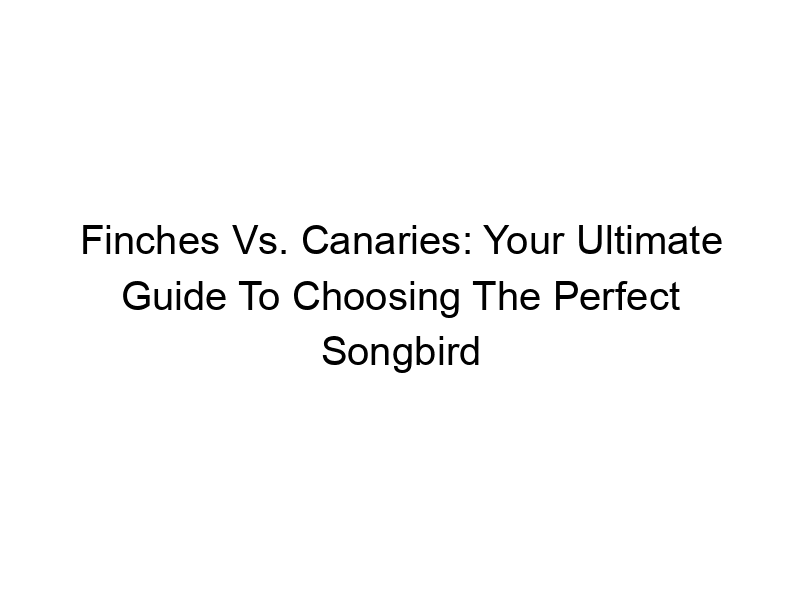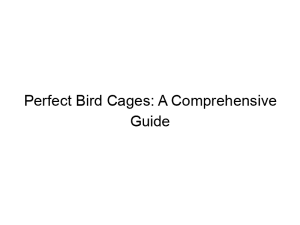Choosing a pet bird can be an exciting but overwhelming experience. There’s a world of feathered friends to consider, each with its own unique personality, care requirements, and vocalizations. This comprehensive guide will help you decide between two popular choices: Finches vs. Canaries: Which One is the Best Pet for You? We’ll delve into the pros and cons of each, comparing their temperaments, care needs, singing abilities, and overall suitability for different lifestyles. By the end, you’ll be well-equipped to choose the perfect songbird companion.
Finches encompass a vast family of birds, with thousands of species exhibiting diverse colors, sizes, and behaviors. Popular pet finches include Zebra finches, Gouldian finches, Society finches, and Bengalese finches. Each species has unique characteristics that influence their suitability as pets. For instance, Zebra finches are hardy and readily
available, while Gouldian finches are more challenging to care for, requiring specialized diets and environments.
Finch Temperament and Behavior
Finches are generally social birds that thrive in flocks. They are often described as active, inquisitive, and playful. While not typically known for being cuddly like some larger birds, their energetic nature and social interactions can be very entertaining to watch. However, handling finches should be kept to a minimum, as they can be easily stressed.
Housing Finches
Providing adequate space is crucial for finch well-being. A spacious cage with multiple perches, toys, and food/water dishes is essential. The cage should also be placed in a location away from drafts and direct sunlight. Finches need a clean environment; regular cleaning of the cage is paramount to prevent the buildup of bacteria and parasites.
Finch Diet and Nutrition
A balanced diet is essential for finch health. A high-quality finch seed mix, supplemented with fresh fruits, vegetables, and occasional protein sources (like mealworms), will ensure proper nutrition. Always provide fresh water daily.
Finch Lifespan
Depending on the species and care provided, finches can live for 5-10 years or even longer.
Understanding Canaries
Canary Varieties
Canaries are renowned for their beautiful songs and come in various colors and breeds. Popular varieties include the Lizard Canary (known for its distinctive plumage), the Border Canary (appreciate for its posture), and the Roller Canary (celebrated for its intricate singing style).
Canary Temperament and Behavior
Canaries are generally docile and gentle birds, though some individuals may be more skittish than others. They are often described as calm and peaceful, making them suitable pets for those seeking a less demanding companion. While they don’t require extensive interaction, regular observation and interaction can strengthen the bond.
Housing Canaries
Similar to finches, canaries need a spacious cage with ample perches, toys, and food/water dishes. The cage should be placed in a quiet location away from drafts and direct sunlight. Regular cleaning is essential to maintain hygiene and prevent disease.
Canary Diet and Nutrition
Canaries thrive on a diet of canary seed mixes, supplemented with fresh fruits, vegetables, and occasional treats. A well-balanced diet contributes significantly to their health and vocal abilities. Fresh water should be available at all times.
Canary Lifespan
With proper care, canaries can live for 8-10 years or more.
Finches vs. Canaries: A Detailed Comparison
Singing Abilities
Both finches and canaries are known for their songs, but they differ significantly in style and complexity. Canaries are famous for their melodious and varied songs, often performing intricate trills and whistles. Finches, on the other hand, tend to have simpler songs, often characterized by chirps and tweets.
Social Needs
Finches are highly social and thrive in pairs or small flocks. Keeping multiple finches together is often recommended, unless you have extensive experience and time to dedicate to individual socialization. Canaries are less demanding socially, though a pair may bond, particularly during breeding season.
Ease of Care
While both finches and canaries require attention, finches are often considered slightly more demanding, particularly concerning their dietary needs and cage cleaning. Canaries are generally more tolerant of minor inconsistencies in their care.
Cost of Ownership
The initial cost of acquiring a finch or canary can be similar. However, long-term costs, including food, cage maintenance, and potential veterinary care, can vary.
Lifespan and Commitment
Both finches and canaries have relatively long lifespans, requiring a significant commitment from their owners.
Choosing the Right Bird for Your Lifestyle
Active vs. Relaxed Lifestyle
If you lead a busy lifestyle, a canary might be a more suitable choice due to its relatively low maintenance requirements. Finches, with their more active and social nature, might require more time and attention.
Experience with Birds
Beginners might find canaries easier to manage due to their gentler temperament and less demanding care needs. Finches, with their more complex social dynamics and dietary requirements, are generally better suited to experienced bird owners.
Space Considerations
Both finches and canaries require adequate cage space. However, the number of birds kept significantly influences the required space. Considering multiple finches will require a larger enclosure compared to a single canary.
Setting up a Bird’s Habitat
Cage Size and Selection
Choose a cage that’s large enough to accommodate the bird’s natural movements and behaviors. The cage should have multiple perches at different heights, providing the bird with opportunities to climb and explore.
Cage Accessories
Provide a variety of toys and accessories to keep your bird entertained and mentally stimulated. This includes swings, bells, and foraging toys. Ensure toys are safe and appropriate for the species.
Placement of the Cage
Place the cage in a location that is away from drafts, direct sunlight, and loud noises. A quiet and peaceful environment contributes to the bird’s well-being.
Maintaining a Clean and Healthy Environment
Regular Cleaning
Regular cleaning of the cage and accessories is crucial to prevent the buildup of bacteria and parasites. This involves regularly changing the food and water, removing droppings, and scrubbing the cage with a bird-safe disinfectant.
Hygiene Practices
Maintain good hygiene practices when interacting with your bird to prevent the spread of disease. Wash your hands before and after handling the bird or its cage.
Bird Health and Nutrition
Essential Nutrients
Both finches and canaries require a balanced diet rich in essential nutrients. Provide a variety of high-quality seed mixes, fresh fruits, and vegetables.
Potential Health Issues
Be aware of potential health issues associated with both finches and canaries, including respiratory infections and nutritional deficiencies. Regular veterinary check-ups are essential.
Common Misconceptions about Finches and Canaries
Myth 1: Finches are too high-maintenance.
While finches do have specific dietary and social needs, with proper research and preparation, they can be rewarding pets for the right owner.
Myth 2: Canaries are boring pets.
The truth is canaries can be engaging pets, providing companionship and their beautiful songs.
Myth 3: All finches and canaries are the same.
The diversity within these bird families is extensive; the differences in species impact temperament and care needs.
Understanding Bird Behavior
Body Language
Understanding bird body language is crucial for recognizing signs of illness or stress. Learn to identify signs such as ruffled feathers, lethargy, and changes in appetite.
Training and Bonding
While training birds might not involve tricks like dogs, gentle socialization and interaction can strengthen the bond between bird and owner.
Frequently Asked Questions
What is the average cost of owning a finch or canary?
The initial cost of purchasing a bird is relatively low, but ongoing expenses for food, cage maintenance, and veterinary care add up. Expect to spend anywhere from $50 to $150 annually, depending on the specific needs of your bird.
How much space do finches and canaries need?
Finches and canaries need cages that are significantly larger than what’s typically sold in pet stores. A minimum cage size of 24 inches long, 18 inches wide, and 18 inches high is a good starting point for a single bird.
Are finches or canaries better singers?
Canaries are generally considered to be better singers, with more complex and melodious songs than finches.
Can I keep finches and canaries together?
It’s generally not recommended to house finches and canaries together due to their different size, social needs, and disease susceptibility.
How do I choose a healthy bird?
Choose a bird that is alert, active, and has bright eyes. The feathers should be smooth and glossy, and the bird should show no signs of respiratory distress.
What are some signs of illness in finches and canaries?
Signs of illness can include lethargy, ruffled feathers, changes in appetite, respiratory distress, and droppings that are abnormal in color or consistency.
How often should I clean my bird’s cage?
Daily spot cleaning is crucial, involving removing droppings and soiled food. A thorough cage cleaning, with complete disinfection, should be performed at least once a week.
What kind of toys are best for finches and canaries?
Provide a variety of toys, including swings, bells, ladders, and foraging toys. Rotate toys regularly to prevent boredom.
Final Thoughts
Choosing between a finch and a canary depends greatly on your lifestyle, experience, and preferences. Canaries, with their melodious songs and gentler nature, are a fantastic choice for beginners or those seeking a relatively low-maintenance companion. Finches, with their active and social personalities, offer a different kind of rewarding experience but require more dedication and knowledge. Whichever bird you choose, remember that owning a pet bird is a significant commitment. Thorough research and preparation are essential to ensure your feathered friend thrives in your care for years to come. Remember to prioritize their well-being, providing them with a clean, stimulating environment, and a proper diet. By following this guide, you are well on your way to becoming a responsible and loving bird owner, enriching both your life and the life of your new pet.




